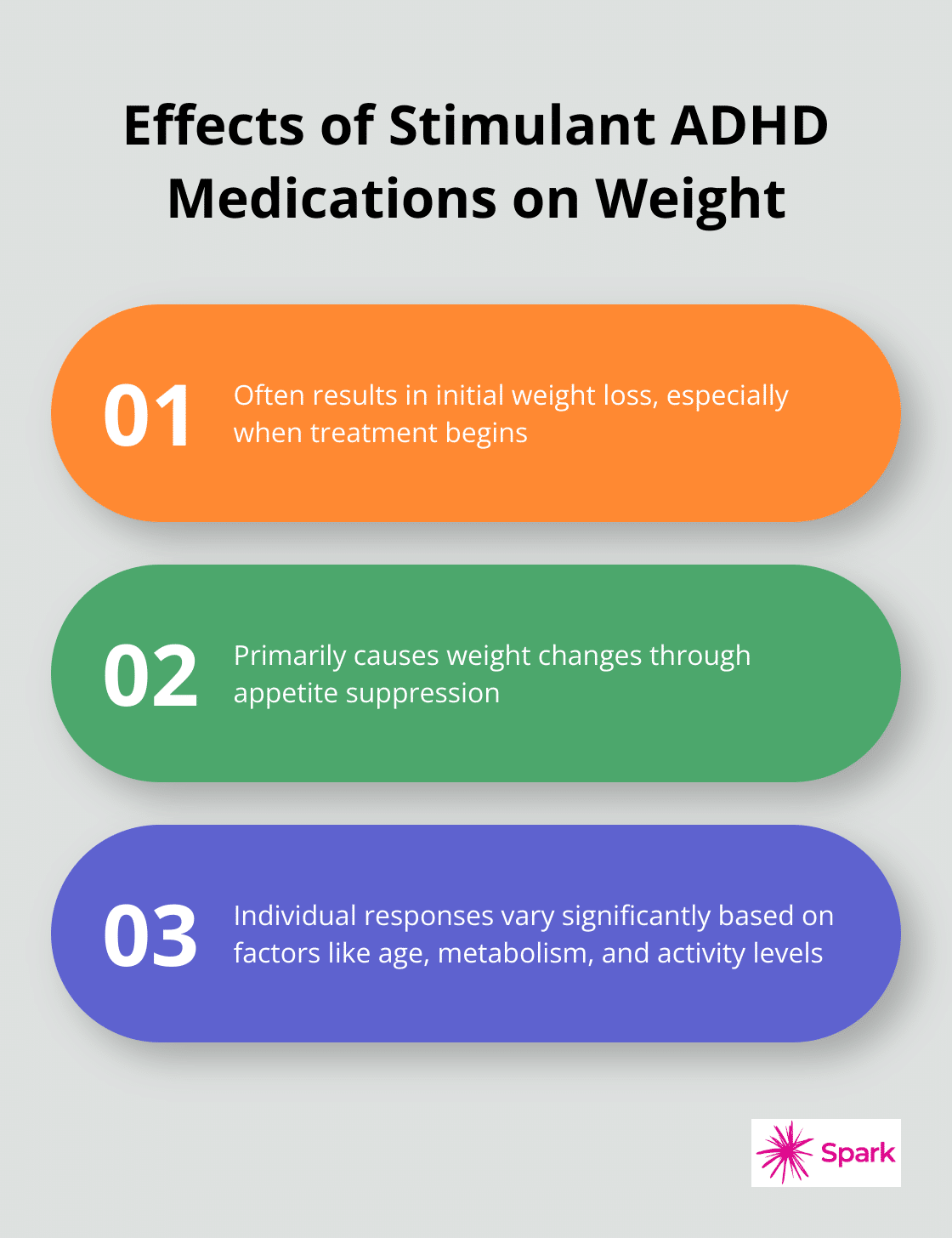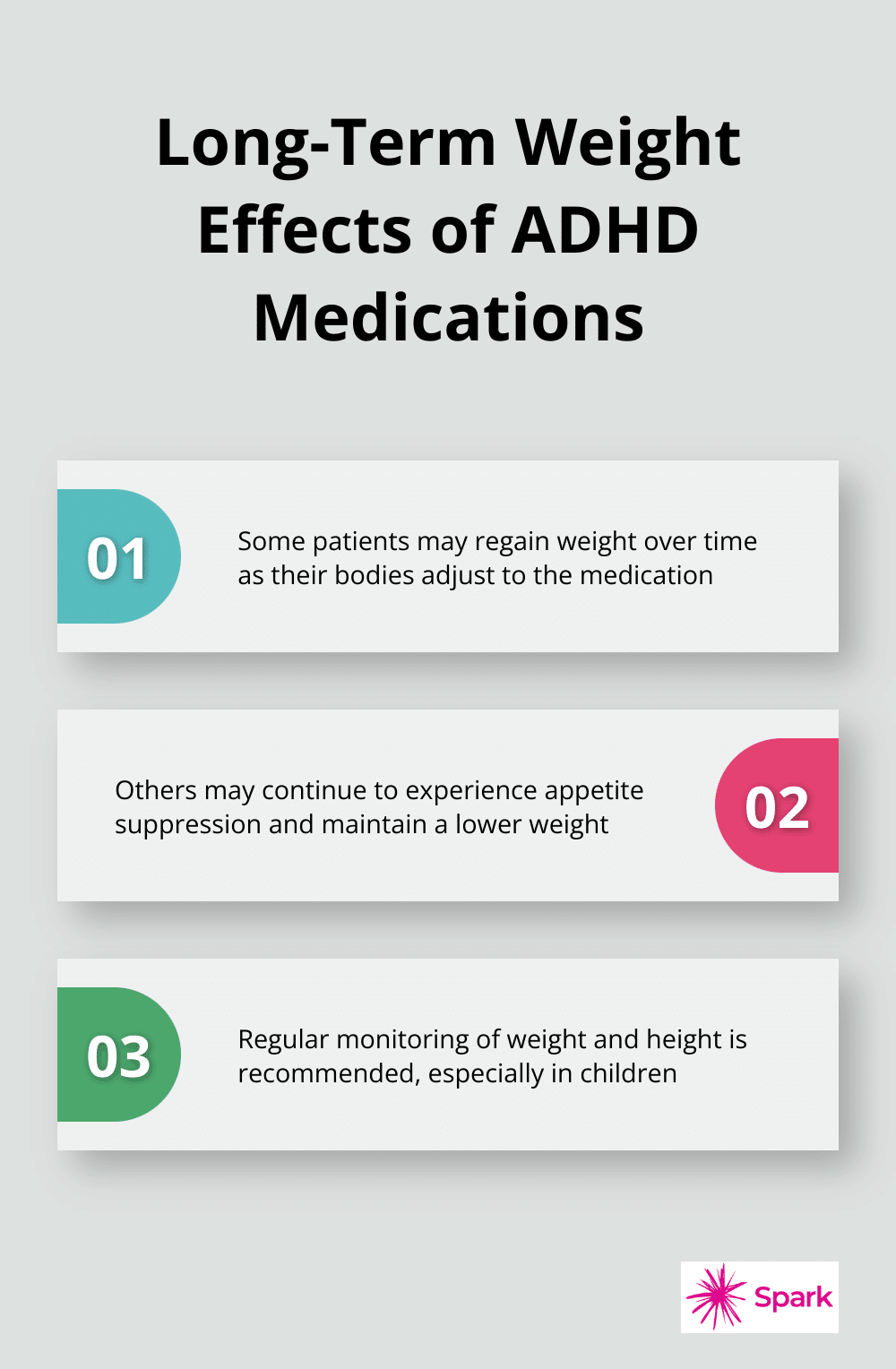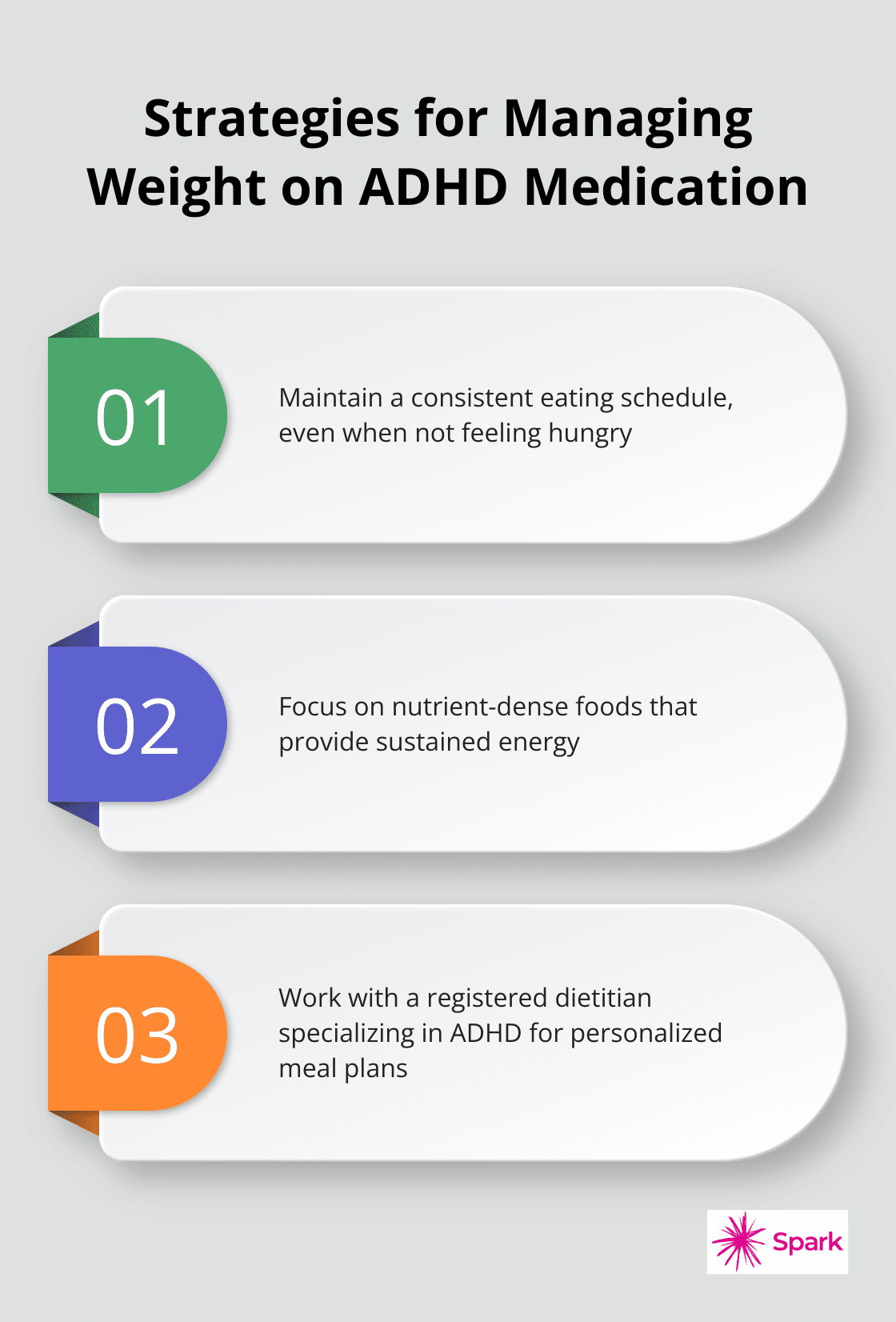At Spark Healthcare, we understand the complex relationship between ADHD medications and weight loss. Many patients experience unexpected changes in their body weight when starting treatment for attention deficit hyperactivity disorder.
This blog post explores the connection between ADHD medication and weight loss, providing insights into what you can expect and how to manage potential side effects. We’ll dive into the science behind these medications, their impact on appetite and metabolism, and offer practical strategies for maintaining a healthy weight while managing ADHD symptoms.
How ADHD Medications Affect Weight
Stimulant Medications and Weight Loss
ADHD medications, particularly stimulants, can significantly impact weight. Methylphenidate (Ritalin) and amphetamine/dextroamphetamine (Adderall) are the most commonly prescribed ADHD drugs. These medications improve focus and impulse control, but also affects appetite and metabolism.
Stimulant medications often result in weight loss, especially when treatment begins. This weight loss primarily occurs due to appetite suppression, a common side effect of stimulant medications.

Non-Stimulant Medications and Weight Changes
Non-stimulant ADHD medications, such as atomoxetine (Strattera) and guanfacine (Intuniv), typically have less impact on weight. However, some patients may still experience changes in appetite or metabolism. A newer class of ADHD medications may have different effects on weight compared to stimulants.
Long-Term Weight Effects of ADHD Medications
The long-term effects of ADHD medications on weight are more complex than initial weight loss. Some patients regain weight over time as their bodies adjust to the medication. Others continue to experience appetite suppression and maintain a lower weight. The American Academy of Pediatrics recommends regular monitoring of weight and height in children taking ADHD medications to ensure healthy growth.

Individual Variations in Weight Response
It’s important to note that weight changes can vary significantly between individuals. Factors such as age, metabolism, diet, and physical activity levels all play a role in how ADHD medications affect weight. Some patients may experience significant weight loss, while others may see little to no change.
Monitoring and Managing Weight Changes
Healthcare providers should closely monitor weight changes in patients taking ADHD medications. This monitoring allows for timely adjustments to treatment plans if necessary. Patients should report any significant weight changes or concerns to their healthcare provider promptly.
As we move forward, let’s explore the specific mechanisms through which ADHD medications influence weight and appetite.
How ADHD Drugs Affect Your Brain and Body
The Neurotransmitter Connection
ADHD drugs target dopamine and norepinephrine, two key neurotransmitters in the brain. These medications work by increasing the levels of norepinephrine in your brain. This change also affects the body’s hunger signals and metabolism. Some patients experience a reduction in appetite upon initiating or increasing the dose of stimulant therapy.
Appetite Suppression and Food Preferences
Many ADHD medication users report a significant decrease in hunger, especially during the day when the medication is most active. This often leads to skipped meals and reduced calorie intake. Additionally, some patients notice changes in their food preferences.
Increased Physical Activity
ADHD medications can boost energy levels and reduce fatigue, which potentially leads to increased physical activity. Children with ADHD are less likely than their peers to meet recommended levels of physical activity. This increased energy expenditure can contribute to weight loss.
Individual Variations in Response
The effects of ADHD medications on weight and appetite vary widely between individuals. Some patients experience significant weight loss, while others see minimal changes. Factors such as age, metabolism, diet, and physical activity levels all play a role in how ADHD medications affect weight.
Monitoring and Adjusting Treatment
Regular check-ins with a healthcare provider are essential to monitor these effects and adjust treatment as needed. Keeping a food and activity diary when starting ADHD medication can help track changes in appetite, food preferences, and activity levels. This information allows for more personalized treatment adjustments if necessary.
As we explore the impact of ADHD medications on weight and appetite, it’s important to consider strategies for managing these changes effectively. The next section will discuss practical approaches to maintain a healthy weight while on ADHD medication.
Balancing Weight and ADHD Treatment
Nutrition Strategies
Managing weight while on ADHD medication requires a proactive approach. Eating regular, balanced meals is important when taking ADHD medication. Even if you don’t feel hungry, stick to a consistent eating schedule. Focus on nutrient-dense foods that provide sustained energy. Protein-rich snacks (nuts, Greek yogurt, or hard-boiled eggs) can help maintain stable blood sugar levels.
Work with a registered dietitian who specializes in ADHD. They can create a personalized meal plan that accounts for your medication’s effects on appetite. Some patients find success with smaller, more frequent meals throughout the day.

Physical Activity Considerations
Exercise plays a vital role in managing both ADHD symptoms and weight. Choose types of physical activity that are appropriate for your current fitness level and health goals, as some activities are safer than others.
If you experience increased energy from your medication, channel it into physical activity. This can help manage weight and improve overall well-being. However, be cautious not to overexert yourself, especially if you experience appetite suppression.
Monitoring and Adjusting
Keep a detailed food and activity journal when starting ADHD medication. This helps identify patterns in appetite, eating habits, and physical activity levels. Share this information with your healthcare provider during follow-up appointments.
Regular weigh-ins (ideally weekly) can help track trends. If you notice significant weight loss, contact your healthcare provider immediately. They may need to adjust your medication dosage or explore alternative treatments.
Personalized Approach
Managing weight while on ADHD medication is a balancing act. It’s about finding the right combination of medication, nutrition, and lifestyle choices that work for you. Don’t hesitate to reach out to your healthcare provider if you have concerns. Be aware that appetite suppression from ADHD medication can be temporary, and your appetite may return once the medication wears off.
Final Thoughts
ADHD medications can significantly impact weight, particularly through appetite suppression in stimulants. The effects vary widely among individuals, highlighting the need for personalized treatment plans. Patients must work closely with healthcare providers to monitor weight changes and adjust treatment as needed (including medication dosages, nutritional strategies, and physical activities).
The relationship between ADHD medication and weight loss is complex. Some individuals experience significant weight changes, while others see minimal effects. Finding the right balance between effective symptom management and overall health is essential for successful ADHD treatment.
At Spark Healthcare, we understand the challenges of ADHD treatment and its potential side effects. Our team offers telepsychiatry services to help you manage your ADHD symptoms effectively while maintaining your overall health. If you have concerns about ADHD medication weight loss, contact us for tailored solutions that address your unique needs.






